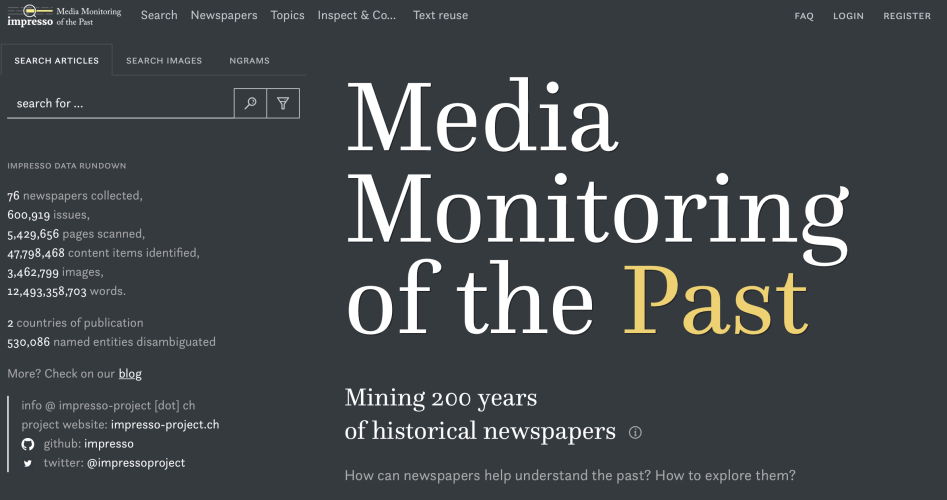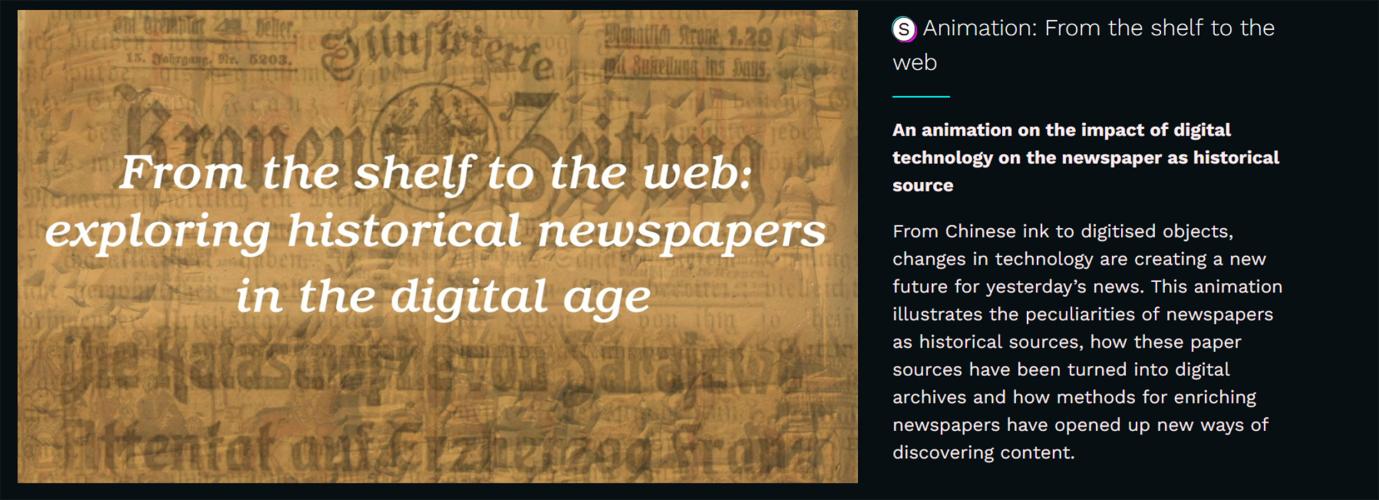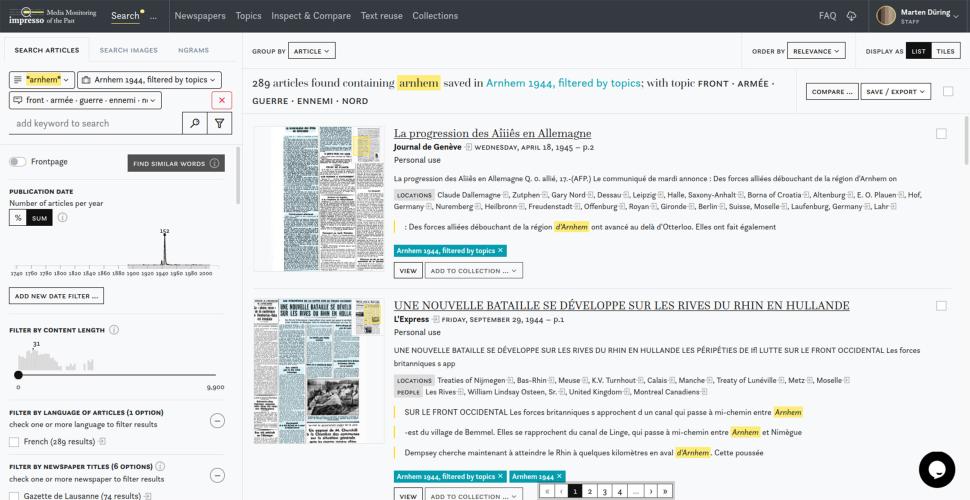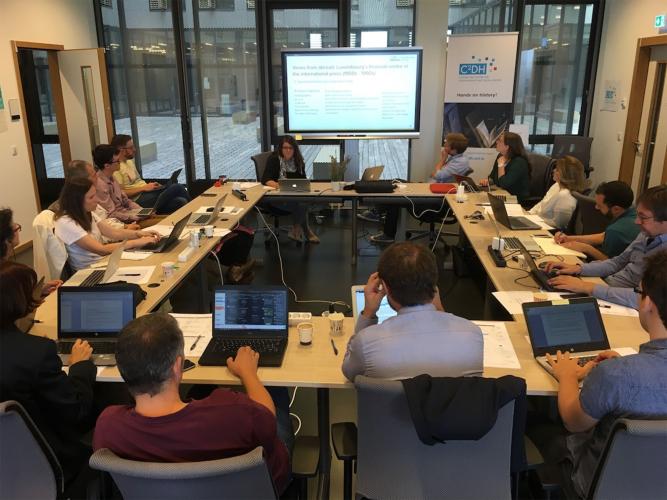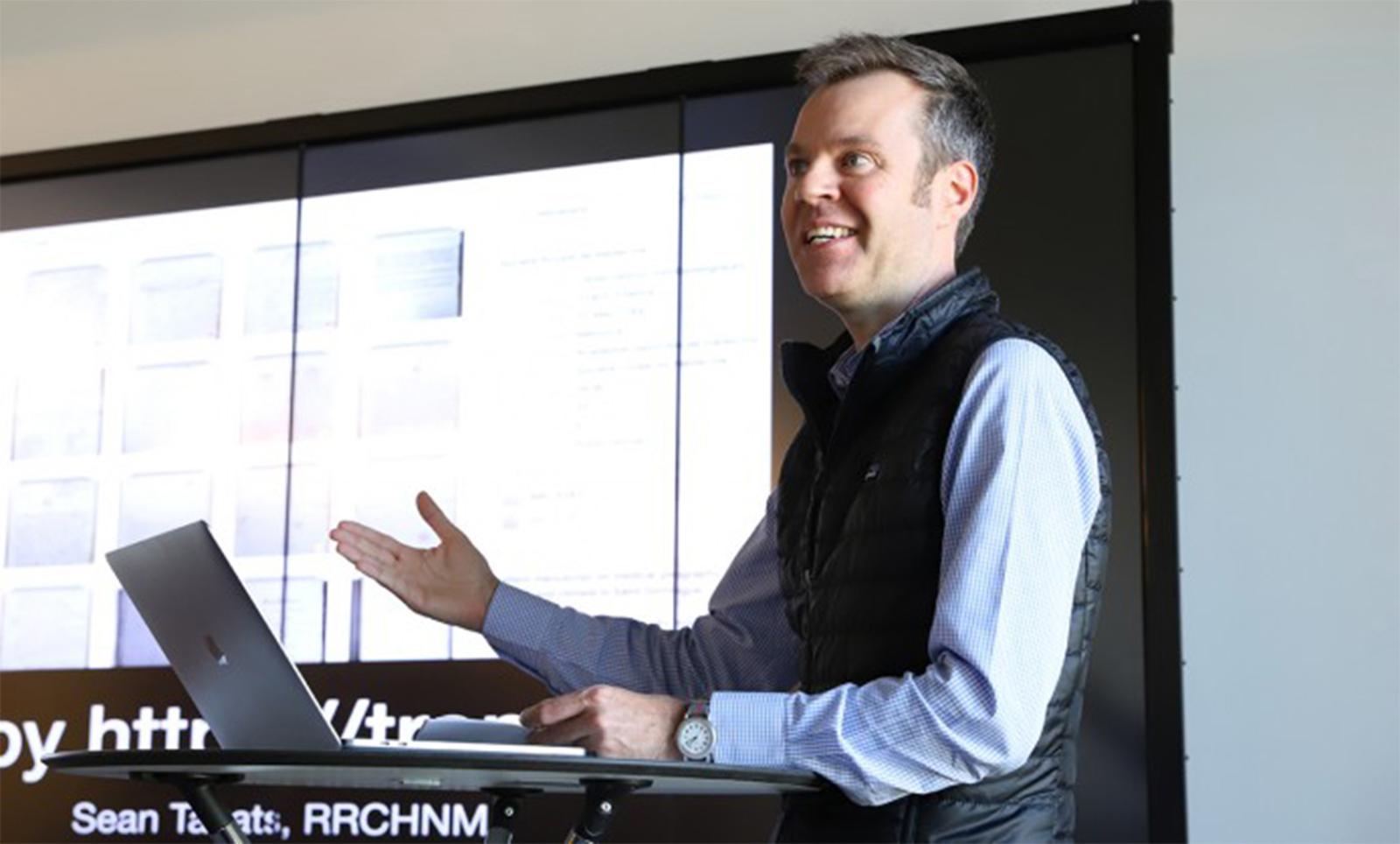
DHARPA
In 2022, DHARPA made continued progress on its overarching objectives: the establishment of a sustainable new lab dedicated to blue-sky research in digital history and the development of a new software platform for data orchestration and historical analysis.
We continued to make progress across all work packages despite significant personnel turnover. The recent arrival of new team members extends our development of the software and its capabilities. With the addition of several postdoctoral researchers in adjacent projects, we now have ten full-time researchers participating in the DHARPA project. Their research programs inform our software development and have already significantly increased DHARPA’s scientific output. Unsurprisingly, the pandemic continues to disrupt the team's activities, though this year we largely returned to on-campus work, and some conference travel has resumed. In 2022 we were awarded a major research grant to continue development on Tropy, a related software platform that facilitates archival research.
Tropy
Tailor-made for the archival research of today, Tropy is a free and open-source tool designed and produced by an international team of historians and software developers. It helps researchers to take control of their sources by transforming photos into items, adding metadata, annotating, organizing, and exporting their Tropy projects. In 2022, the Tropy team worked to develop a new capacity for handling large-scale research projects and enabling new integration with third-party tools and services. Two new versions were released, fixing issues and implementing new features, especially regarding import/export plugins. Outreach efforts focused on increasing awareness about fresh features and reaching out to new audiences. Tropy went to various conferences, and a series of advanced trainings was offered at customized workshops. The regions reached throughout the year brought Tropy to both English and non-English Speaking publics, resulting in new connections in Italy, Sweden, the UK, Luxembourg, US, Mexico, Venezuela and Brazil.
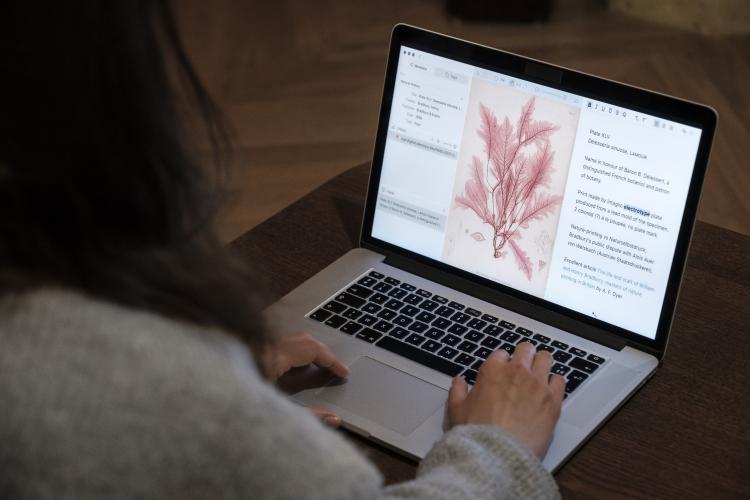
LuxTIME
In the LuxTIME project, we collaborate with the main stakeholders of historical data in Luxembourg (archives, libraries, research institutions, governmental bodies, and private associations) to build an interdisciplinary consortium for the analysis and interpretation of historical “big data.” In 2022, we surveyed multiple institutions in Luxembourg, which have or work with a diverse collection of data. Specifically, we had interviews with the National Library of Luxembourg (BNL), National Archives of Luxembourg (ANLux), Luxembourg Institute of Socio-Economic Research (LISER), Luxembourg Institute of Science and Technology (LIST), Luxinnovation, Historical Consulting, Luxembourg Income Study Database (LIS), Luxembourg Centre for Contemporary and Digital History (C2DH), Ministry of Culture, and the Centre national de l’audiovisuel (CNA). Based on the reports from the interviews, we have a map of the state of the art of digitization in Luxembourg. We also worked with a non-profit company (JOGL) that could provide us with digital infrastructure to set up and communicate our project. Lastly, we communicated with the EU Time Machine, and we have its support on the development of a collaborative governance model, in which we will work in the first months of 2023.
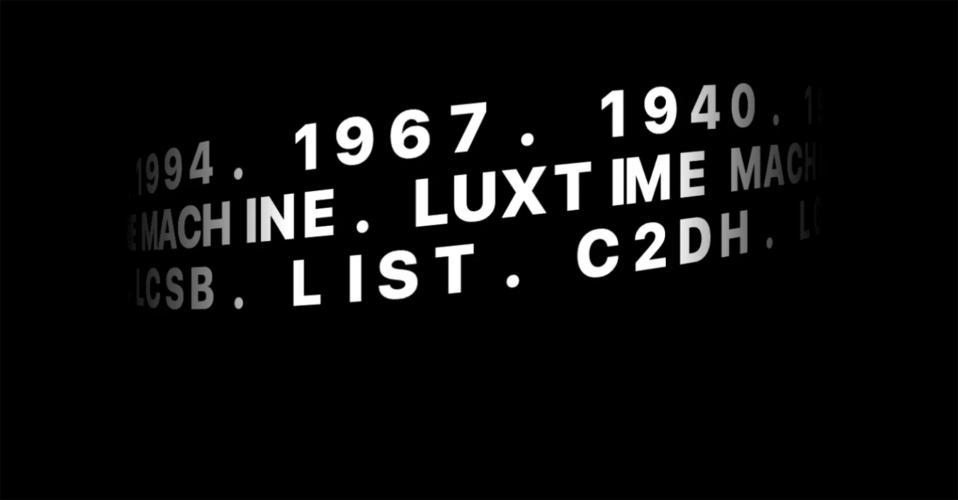
Zoomland
Zoomland. Exploring Scale in Digital History and Humanities is a book and workshop project based on the thinkering grant obtained by Florentina Armaselu in 2019. The book explores the epistemological dimensions, hermeneutic methods, empirical tools and aesthetic logic pertaining to the notion of scale in digital history and humanities. The volume is edited by Florentina Armaselu and Andreas Fickers and will be published in open access with De Gruyter as part of the “Studies in Digital History and Hermeneutics” series. On 22 June 2022, the two editors organised at the C2DH a writing workshop during which the drafts of the accepted chapters were presented and collectively discussed. The hybrid workshop gathered more than 20 participants from 17 European and American institutions. The book is currently in the third and final reviewing and validation phase before being sent to the publisher and is expected to be published in fall 2023.
https://www.c2dh.uni.lu/news/zoomland-exploring-scale-digital-history-and-humanities
Nexus Linguarum use case in the Humanities
Nexus Linguarum use case in the Humanities is a project coordinated by Florentina Armaselu within the working group 4 of the COST Action CA18209 - European network for Web-centred linguistic data science. The aim of the use case is to combine natural language processing (NLP) and linguistic linked open data (LLOD) methods and formalisms in analysing multilingual diachronic corpora and the evolution of concepts over time. The outcome will consist of a set of diachronic ontologies to be published on the LLOD cloud. The use case group includes members from 7 countries and involves collaboration through monthly meetings and participation in workshops, conferences, seminars, and journal publications. In 2022, one of the papers published by the group in the Semantic Web Journal, IOS Press, was selected for showcasing by Kudos, a Web platform bridging research, producers, and users.
https://nexuslinguarum.eu/, https://www.growkudos.com/publications/10.3233%25252Fsw-222848/reader
Training Trading Zone
Training Trading Zone is a C2DH initiative intended to provide to the C2DH team the opportunity to participate (as trainers or trainees) in training activities covering a variety of areas of expertise (or trading zones), such as history and historiography, computer science, archival and data science, digital media, and digital humanities. The Training Trading Zone team, coordinated by Florentina Armaselu, includes 9 C2DH members (professors, research scientists and specialists, and PhD students). The training programme proposed by the team for 2022-2023 contains 27 training titles in various formats (live sessions, onsite/online workshops, recorded materials), and involves internal and external trainers (C2DH, Poland, The Netherlands) and participants (C2DH, IHIST, Standing with Ukraine, #ScienceForUkraine-Luxembourg, University of Saarbrücken). In 2022, the team coordinator joined a series of discussions at the University level regarding the potential development of the Digital Academy project based on an initial idea proposed by Andreas Fickers.
2022 DH Benelux conference
Lorella Viola and Marten Düring with other C²DH team members served as local organisers for the 2022 DH Benelux conference in Belval. The conference series serves as a platform for the Digital Humanities community in the region. During the hybrid event, more than 150 researchers in computer science, software development, humanities research and cultural heritage presented and discussed their latest research, tools and projects. The hybrid event took place between May 30th and June 3rd in Belval.
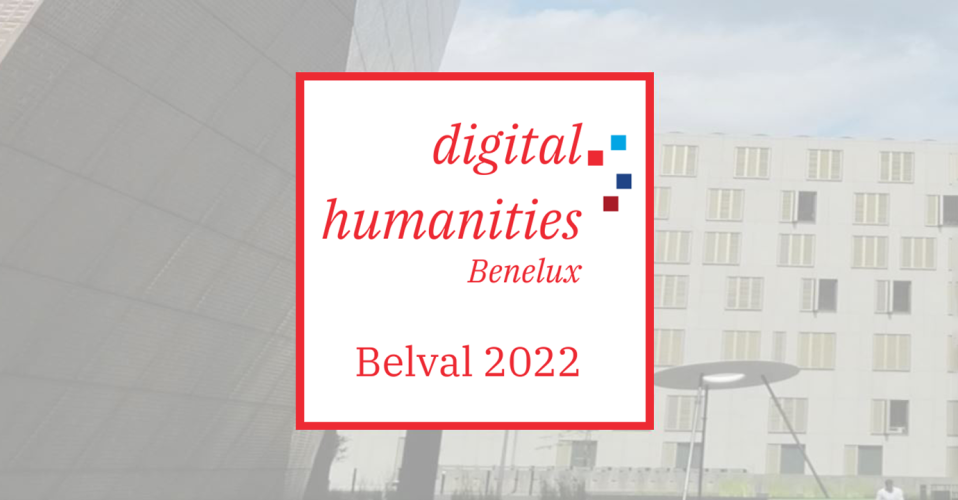
Dagstuhl seminar
Marten Düring co-organised a Dagstuhl seminar titled “Computational Approaches for Digitized Historical Newspapers”. A group of 22 computer scientists, historians and librarians gathered between July 17th and 22nd on-site and remotely at Dagstuhl castle to discuss challenges surrounding content classification, supra-national research infrastructures, linked entity disambiguation and transparency.
https://www.dagstuhl.de/en/seminars/seminar-calendar/seminar-details/22292
impresso
In the context of the impresso project, Marten Düring organised a two-day workshop titled “Text Reuse at Scale”. Usage scenarios developed during the workshop centred on the integration of text reuse data and other forms of enrichment such as topic modeling and content type classification. Workshop findings inform the re-design of impresso’s text reuse interface and allow the scalable reading of content reuse in historical newspapers
The team behind the impresso project has secured follow-up funding. Building on the first project, impresso will now focus on the integration and enrichment of Western European historical newspapers and radio archives to facilitate both exploratory and computational historical research. The project is funded by the Swiss National Science Foundation and the Luxembourg National Research Fund with 3 million Euro and will run between 2023 and 2027.
